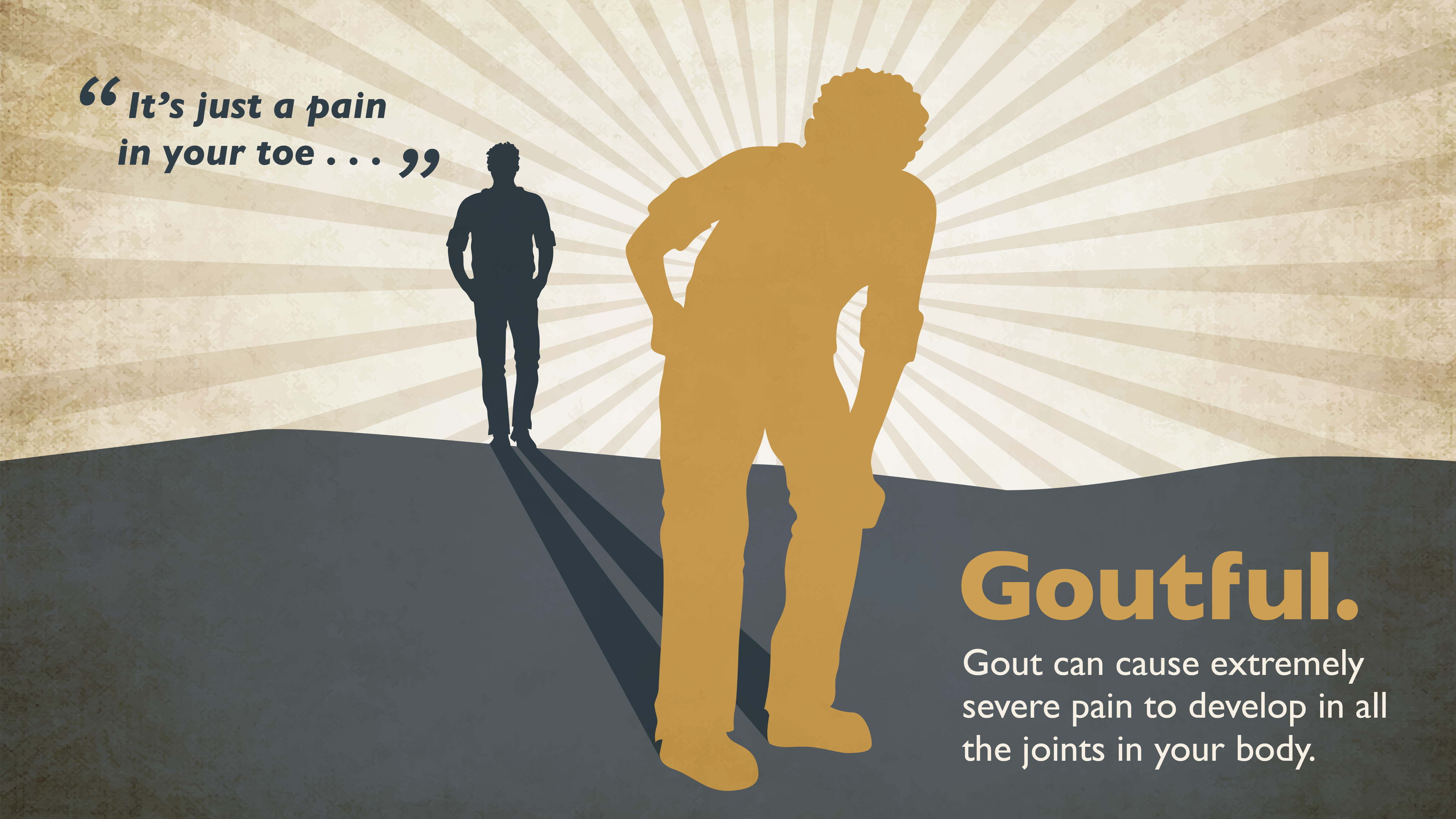
The American Kidney Fund's (AKF) Goutful campaign debunks popular misconceptions about gout and supports chronic kidney disease (CKD) patients who are fighting this painful, chronic disease. Goutful helps CKD patients develop an understanding of their risk for gout, its relationship to CKD and the necessity of treating it as a chronic disease, rather than a series of acute episodes.
About 1 in 10 people with CKD have gout, and 40 to 60% of people with gout have CKD. Despite this overlap, research indicates many CKD patients hold false beliefs about gout that are informed by antiquated myths. Many patients avoid discussing gout and seeking treatment. Instead, they turn to "Dr. Google"—3.7 million did last year alone. To overcome this, the AKF developed a campaign to raise awareness of the connection between gout and CKD called Goutful, a portmanteau of "gout" and "doubtful."
The primary objectives of Goutful are:
1. To start a conversation on social media that will destigmatize gout for CKD patients.
2. To make a difference in CKD patients' lives by giving them the education and tools needed to destigmatize gout.
3. To empower patients to share this information with their own social networks in hopes their family and friends will better understand what patients go through.
Before Goutful, there were very few social conversations about gout and CKD. AKF recognized this clear void and sought to make social media one of the main channels of communication for Goutful, along with other digital communications methods.
AKF conducted a literature review, environmental scan and needs assessment to determine the scope of prior existing educational content connecting gout and CKD. We found no formally branded campaigns and confirmed our belief that gout was a commonly misunderstood condition that possessed significant stigma because many misperceive it being caused by overindulgence.
We knew we needed to hear from patients as we developed Goutful, but our social listening found gout was not often discussed online. We would glean valuable intelligence about the patient perspective if we started a conversation about gout with our audience. We would also lay the groundwork for AKF to be talking about gout in a formal campaign later in 2018.
To achieve our objectives, we launched a series of call and response Facebook posts to determine the questions patients had about gout. We hosted a Facebook Live event for our 135,000 followers—a conversation between one of the few kidney patients our social listening identified as an influencer on the gout patient experience, and a rheumatologist who specializes in managing gout. We encouraged viewers to comment and ask questions, and they did. The event reached 45,888 people, received 24,000 views, and solicited 503 reactions, comments and shares. The information gathered from the call and response posts, patients' comments from the event and formative research was used to determine the key messages in Goutful: Gout is often not caused by overindulgence, it can be debilitating and cause long-term damage, it can be chronic, and it can be prevented with medications. We chose the Goutful myth-busting theme of the campaign, tying the messages to pervasive, opposing and incorrect myths.
A series of engaging graphics illustrate the common myths, providing continuity across AKF's multi-channel strategy designed to maximize Goutful's reach to our target audience. These popular graphics expose the incorrect myths about gout and provide information about how gout can affect patients.
We built awareness for Goutful across multiple channels, including a press release announcing the campaign, blog posts, email campaigns, organic social content, paid search and social ads, and ongoing search engine optimization to draw traffic to the campaign landing page. AKF developed Goutful signage and print materials to distribute at conferences, and devoted an article to Goutful in our quarterly patient print newsletter.
We engaged the public by offering a guide on talking to your doctor about gout and an interactive myths vs. facts quiz on our website testing people's gout knowledge.
AKF measured conversions on our website, including an email acquisition survey for visitors who opted-in to receive web downoadables and who completed our quiz.
We remarketed Goutful via paid social and other ads, and measured conversions from the remarketing efforts.
We cultivated Goutful's audience by providing an informational confirmation page on our website, setting up an email autoresponder and a customized email series.
AKF's Goutful campaign and quiz, supported by an educational grant from Horizon Pharma, help provide answers for the millions of people who turn to Google for information about gout each year.
Goutful has been a success and conversation-starter since its launch in August 2018, performing better than many of AKF's other major awareness campaigns.
As of February 1, 2019, Goutful has received over 161,000 pageviews from paid search and social (over 81,000), organic search (over 35,000) and organic social (over 31,000). Our organic search numbers confirm Goutful is filling a void for patients who turn to Google for answers. The average bounce rate for Goutful content on our website is 30.35% – an excellent rate and 23% lower than the average bounce rate on our website overall. We collected over 500 email addresses, which we will use for continued communication in Goutful's second phase.
The top cities in which visitors to the Goutful content on our website are located have been New York, Chicago, Los Angeles, Dallas-Ft. Worth, Atlanta, Philadelphia, San Francisco-Oakland-San Jose, Washington, Detroit and Houston. These cities and the states they are in have some of the highest prevalence of CKD and largest numbers of at-risk individuals in the nation.
More than 11,000 visitors to the AKF website completed the Goutful quiz. One-third of the people AKF targeted via Facebook ads visited our website and completed the quiz. This high rate of completion has allowed us to collect information about patients' and the public's understandings about gout, and will inform AKF's future educational materials about gout for patients, caregivers and medical professionals.
We plan to use this approach as a framework for AKF's future patient awareness campaigns.





